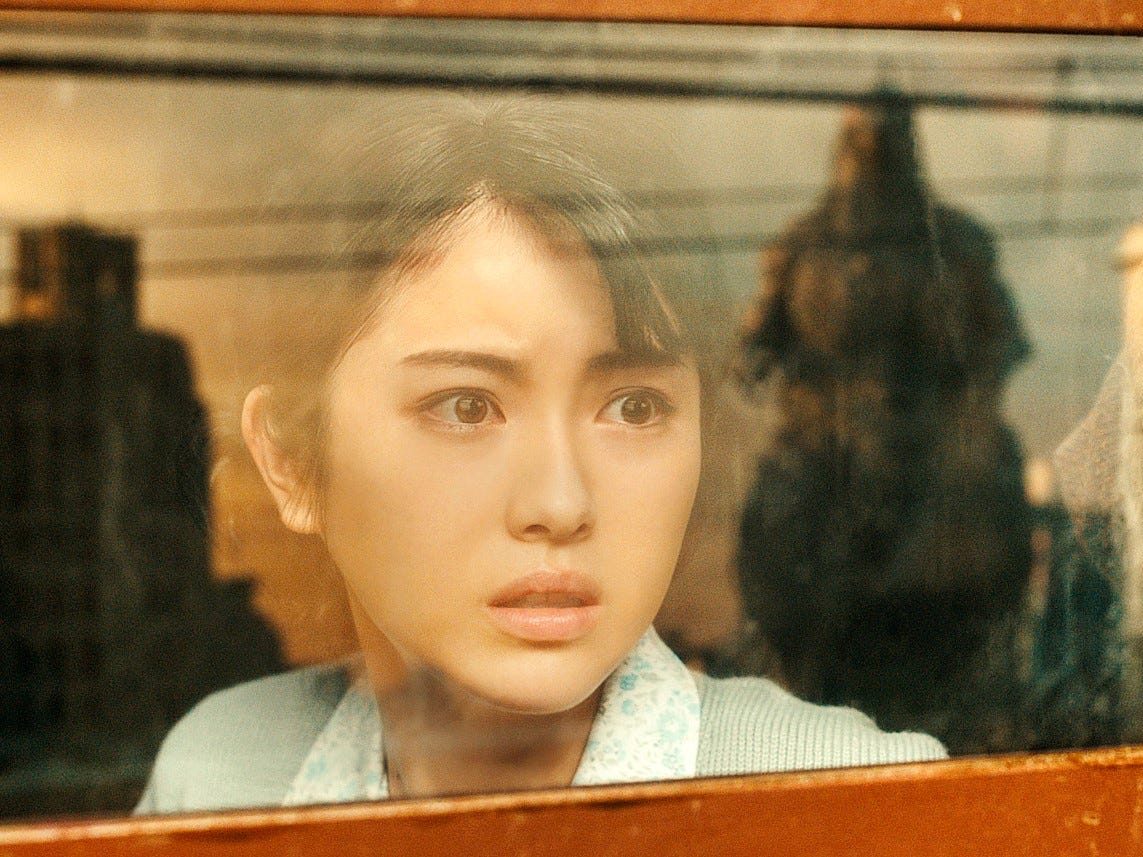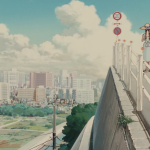INTRO
A kamikaze pilot lands on Odo Island, a repair point for kamikaze planes with mechanical issues. The pilot is swiftly informed that the plane has no issues with it. Immediately, you are introduced to the psyche of the pilot, the mechanic, as well as the setting. The efficiency of accomplishing so much in but a few minutes of screentime with limited dialogue is the amuse-bouche of the meal to come.
Takashi Yamazaki identified the key to the best monster and war movies: the people. Many audiences will admit to enjoying seeing Godzilla fistfighting Kong in a neon-lit Hong Kong. The movies that sit with you though, are the ones where you feel for those affected by the calamities of the events rather than rooting for them to be caught in the destruction. Godzilla Minus One goes further still by not only making us feel for the characters but also by exposing us to what it is to be human in the face of calamity, whether that be in World War II or a giant city-destroying monster. I do not believe there is an objective definition of being human, but there are tenets I associate with that principle. This exploration of Toho’s 33rd Godzilla film will be under the lens of those tenets.
BEING FLAWED
The first thing we learn about our protagonist is a flaw: he did not carry out his duty as a kamikaze pilot and instead feigned an issue with his plane to avoid his task. In that same scene, however, a mechanic tells him that they need more people like him who are brave. This theme continues throughout the film. When he returns to Tokyo, his neighbour blames him for the air raids that killed most of the neighbourhood, citing that if soldiers like him had just done their jobs, this would never have occurred. Later in the movie, however, people sympathize with him not going through with his role, implying that the government should never have asked their soldiers to do that.
The movie is about flawed people, but it goes a step further to make you question what the flaw is and who is to blame. Is the flaw not fulfilling your responsibilities and listening to orders, or is the flaw in the order itself that a country volunteers its people to die with no value given to their lives? Koichi Shikishima sees himself as a flawed person, and who could blame him after he froze in the face of Godzilla killing his companions on Odo Island?
This feeling of cowardice and survivor’s guilt leads to further issues, like when he tells his adoptive daughter that he is not her father. Never does Shikishima explicitly say that he sees himself as unworthy, but through that line, the insight into his broken psyche is clear. Many can relate to not being able to get out of their own heads, and the main character of the movie personifies how far that can break you as a person. In the alternate universe where Godzilla never actually comes to Japan after the incident on Odo Island, Shikishima may never have let go of the traumas of his past and learned to live with those around him.
Yamazaki writes the story in such a way that the audience is forced to wrestle with the concept of flaws. We can relate to someone who did not want to walk into their own death, but we can also say that passing on the things that bother you to others around you is not the right way to cope. It makes for a hero who is nuanced and someone you are not immediately supporting despite being invested in their life.
MAKING IT ABOUT YOURSELF
Nothing is more a human trait than taking massive events and making them about yourself. It is not inherently a bad thing, as it can help people bring things they cannot control to things they can try to address, giving them a feeling of free will in situations where they may otherwise be helpless. Whether you are a sports fan who attributes wearing a jersey at home to the team losing or someone who thinks they are the reason the train leaves right as they arrive, we all attribute things to us, whether seriously or jokingly, that have nothing to do with us at all. After all, we are all the main characters of our own lives; therefore, we must be able to change things in our lives ourselves.
This is in stark contrast to the events of the movie, as it starts off in World War II, where no one citizen in Japan has much say in what happens, and then moves onto a mindless monster destroying cities. When Sumiko blames Shikishima for her family being dead, we relate to her plight while also recognizing that one person would not have changed the outcome of the neighbourhood.
Even the protagonist’s relationships are based on his insistence on making it about himself. He cannot be present for a child who looks up to him because of it. He cannot just live his life due to his inability to let go of his own role in what has happened thus far in the film. Another film would have given in to the built-in romance between Noriko and Shikishima, but this film was steadfast in prioritizing the themes over the tropes. The events leading to Noriko being in the city for the Godzilla attack and how that fueled Shikishima are also another aspect of him making the whims of a giant lizard about him and his inability to shoot back in the first scene despite learning that the creature can heal.
Many crumble in the face of existential events such as these if they are not able to narrow it down to addressable aspects, and that’s what the characters of the movie exemplify. We care about them and their struggles because we see how this one event impacts the way they see themselves and life around them.
FORGIVENESS
Forgiveness is so counterintuitive to our base instincts, which tell us not to go back to the thing that hurt us. Yet our ability to gauge a situation and determine that things can change and that the first occurrence that hurts us may not happen a second time is something I consider to be inherent to being human. Some of us have less inclination for it while others have more, but on some level, we all practice it.
The crux of Shikishima’s character development in this film is forgiveness, whether that’s him forgiving himself or others forgiving him. His final choice in the climax to choose his adoptive daughter and later make a family with Noriko and the child was the outcome of this man, who lived for years unable to reconcile the actions he took in the war. So much of who he was was buried under the guilt of his past that he stopped himself from ever living properly. Even his friendships with his colleagues could not overcome the barricade he had built between himself and the world.
One of the strengths of the film to me is that although he found his salvation in the form of defeating Godzilla, and to him, that was making up for his past transgressions, the real emotional core was just seeing how this person would cope. Godzilla could have never attacked Tokyo, and I would still have been interested in following Shikishima’s journey to finally forgive himself.
The unexpected forgiveness that Shikishima got from the surviving mechanic from Odo Island was the actual catalyst for him letting go of the photos he’d hung on to this long and move on. The depiction of forgiveness, for oneself or for others, is a strong aspect that draws you into caring about these people. Could we forgive Shikishima if we were in the mechanic’s position? Could we find it in ourselves to overcome the guilt that dug into him? These are poignant questions that the movie poses without ever focusing solely on them.
RELATIONSHIPS
Although there is a very central protagonist in the movie, everything about him is seen through his relationships with others. Shikishima’s inability to get over the events of his past is shown through his interactions with Noriko; his not moving on with his life is shown through the words he chooses with his adopted daughter; and his mind still being stuck in the war can be seen in his interactions with his colleagues, particularly in the scene where they drink together. We would not have heard him say, “The war isn’t over for me,” without that.
As an animal lover, I would never go as far as to say relationships are a human-specific thing. Many animals exhibit strong social bonds. However, the aspect that makes it human to me is the complexity of these relationships. The complex emotional associations of guilt, despair, hope, and aspiration that are communicated through Shikishima’s relations with others.
We even gain insight into those around him as the supporting cast pulls the performative weight of the story around the stoic and sad protagonist. His neighbour, who previously shunned him for his disgraceful act of cowardice, then shows how her humanity still comes through when helping him with the child. Noriko waiting for Shikishima to finally come around to them being together and eventually giving up on it was perhaps not as explored as it could have been, but the writing does a good job of being economical in conveying the feelings in the short time devoted to it.
Expanding beyond the main character, the tight bond among Shikishima’s colleagues—comprising the kid, the captain, and the doctor—becomes a central focus, carrying the emotional weight of the film’s second half. The way they show their caring towards the kid, the ease with which they communicate, the jokes and banter between the four of them—this all contributes to feeling like these are real people. At the end of the day, none of this works if you don’t manage to feel that.
CONCLUSION
It may seem silly to write this much about a Godzilla film without addressing Godzilla even once, but I believe that these films are only as strong as the human aspects in them. Whether Godzilla looks good or not is irrelevant if we cannot feel the impact of his actions on the people on the ground. The human aspect of Yamazaki’s work is the soul of this movie. If you took out Godzilla from the film altogether, I would still be interested in following these characters as they piece their lives together in the spoils of war.
In the end, Godzilla was just an analogy of the indiscriminate yet unfair consequences of war and the hopelessness that the victims feel in its wake. The messages embedded in the film that spotlight the aspects of war and the mindset of a country devastated by it are personified by the characters we follow, and Godzilla is but an avenue to bring those to the forefront.
Don’t get me wrong, the aspects of Godzilla were terrific, and the impact of Godzilla’s atomic breath attack in Tokyo that levelled the city had me agape in the heater. But often, the human aspect of these films gets pushed to the margins to make way for the CGI spectacle. This film is a testament that the best films can do both, and that quality is what will end up trumping quantity.




Pingback: GCR Oscar picks – GCR